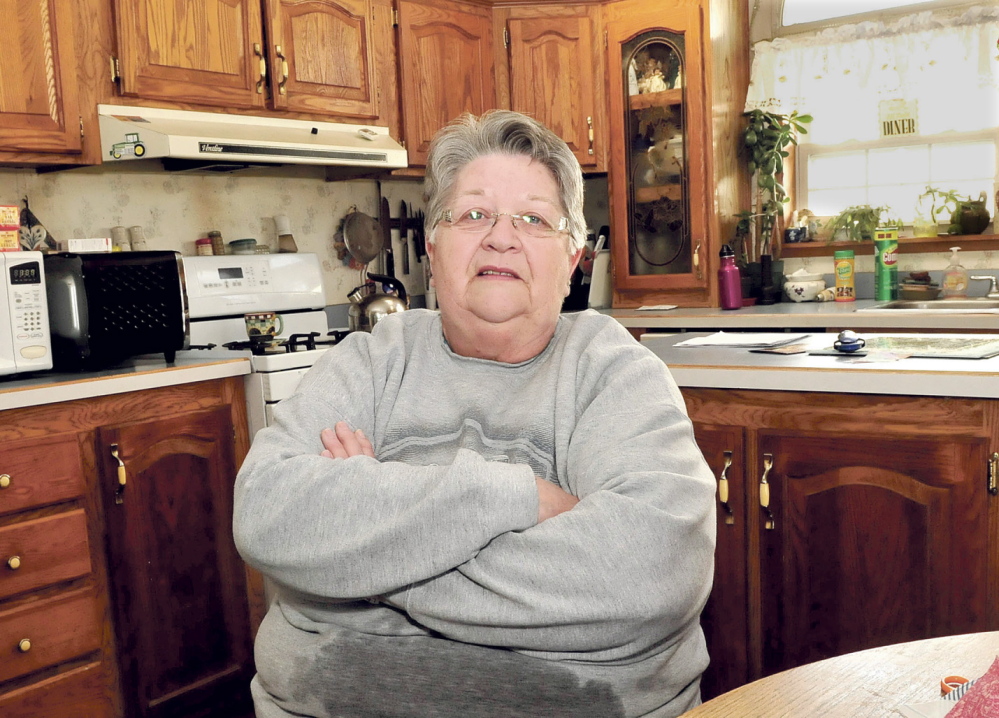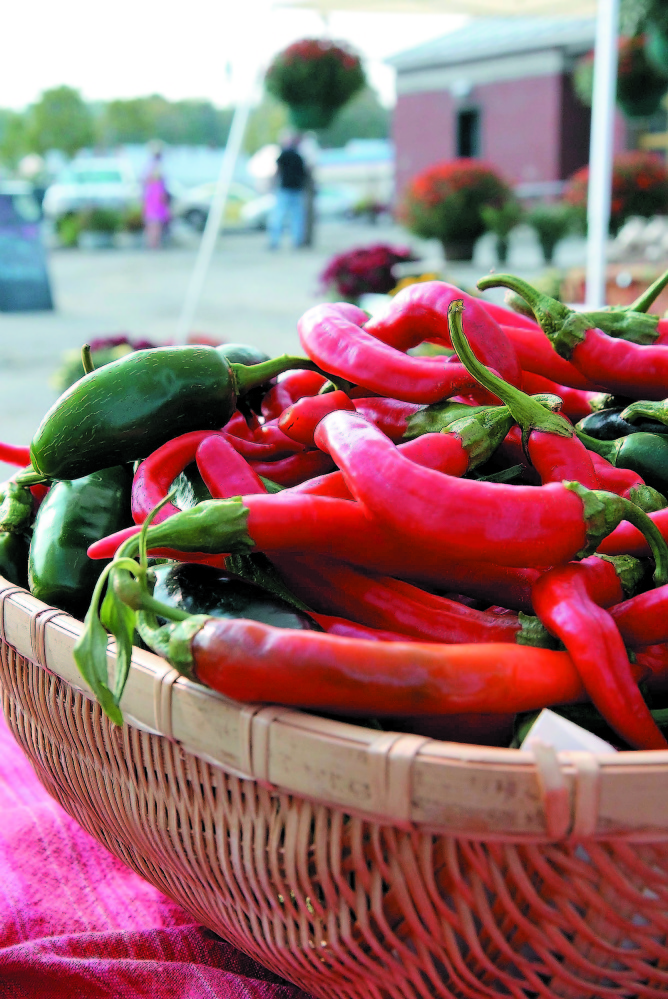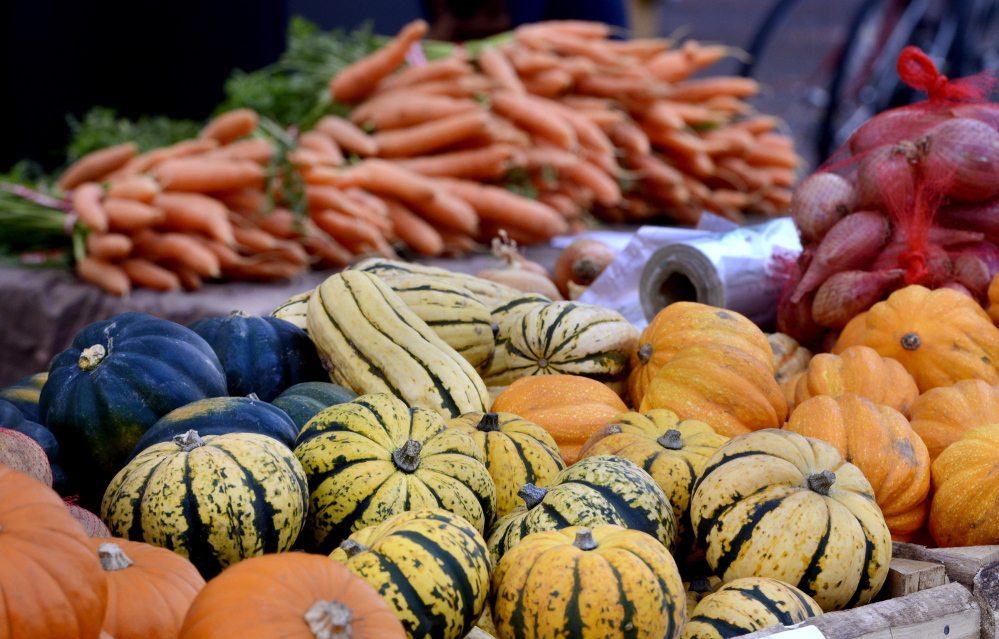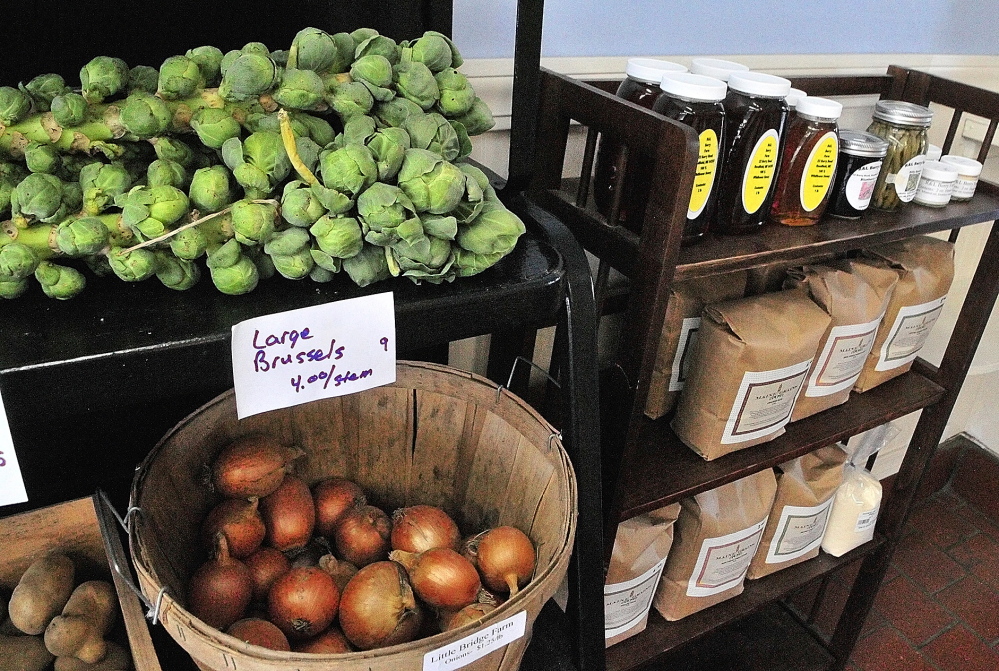Judy Poulin, 70, went to the farmers market every Thursday last summer to get the good stuff.
She roasted the tomatoes in the oven of her yellow mobile home in Fairfield before freezing them in anticipation of soups later in the year.
She pickled the beets, a skill she picked up long ago when, as a little girl, she studied her mother, preparing and cooking meals in the kitchen. She preferred the cucumbers and the string beans fresh, bursting as they were with the kind of dense nutrients only a newly picked vegetable will provide. Nothing was wasted.
Poulin, who lives well below the poverty line — on about $9,000 a year from Social Security benefits — is unflappingly cheerful, but she let out a sad sigh at the thought that there might no longer be pickled beets, greens or fresh produce for her at the market this year.
“That’s going to be tough,” she said. “That’s too bad.”
Poulin is one of about 17,750 Maine seniors who benefited last year from the Maine Senior FarmShare program, which gave each eligible recipient $50 worth of farmers market food vouchers. The U.S. Department of Agriculture has not released funding for the program yet this year, raising concerns about whether the program will be rolled out in time to help farmers and seniors take advantage of the upcoming growing season.
Fifty dollars might not sound like a lot, but for Poulin the amount really helps. She has signed up for FarmShare each year for the last four years.
“Food’s expensive,” she said, “and it’s not getting any cheaper.”
The reason behind the funding delay was the slow passage of a trillion-dollar federal farm bill. President Barack Obama signed the bill into law by on Feb. 7, but only after much political wrangling.
Maine’s Democratic U.S. representative Mike Michaud said he’s pushing federal officials to make sure the funding returns soon to avoid any significant disruptions to the program.
Peter Chandler, chief of staff for Michaud, said the congressman had urged the USDA to move forward quickly “so that states like Maine can begin approving those applications in order to assure that the program is able to provide fresh fruits and vegetables as soon as the harvest happens.” Chandler said the USDA released the funding for the Farm to School program on Feb. 19, which he said is a sign the agency is working through the complex components of the Farm Bill.
“No guarantees, but we’ve weighed in with the USDA,” Chandler said.
One of the program’s strengths is that it has been able to help seniors and farmers alike, according to Chellie Pingree, who released a statement about the delay.
“It gives Maine seniors a chance to access fresh, local food and at the same time puts more money into local farms,” she said.
Spectrum Generations, central Maine’s Area Agency on Aging, which publicizes FarmShare’s offerings to the seniors it serves, raised alarms this week after saying the program apparently had been suspended for 2014.
“It is possible that Congress may re-authorize the program, but the USDA has no way of knowing if or when this will happen,” Gloria Rhode, who helps to coordinate the program for Spectrum, said in a statement.
Until the USDA releases funding, Maine and other states can’t allow their farmers to apply for the program. Last year, applications went out in January and were due back from farmers on Feb. 15.
John Bott, a spokesman for the Maine Department of Agriculture, Conservation and Forestry, said he expects the delay will not derail the program for the year. But one reason the state can’t move forward with the program is that no one knows how much Maine will receive. Last year, it was about $890,000, off from a peak funding level of more than $1 million the previous year.
In addition, the USDA will require the state to submit a five-year plan to administer the program, but Bott said he wasn’t sure how much work that involves.
“We’re in a holding pattern, in terms of getting the specific information from the USDA,” he said.
Even so, Bott said he anticipated the program would be able to catch up on last year’s timetable, with applications going out to farmers within the next week or so and farmers being approved shortly thereafter.
POPULAR PROGRAM
Senior FarmShare was first launched as a pilot program in 2001, amid fanfare and fervent support in the 31 states in which it was made available.
“This new initiative encourages low-income seniors to improve their diets, while helping America’s family farmers increase their markets for locally-grown fruits and vegetables,” then-U.S. Agriculture Secretary Dan Glickman said at the time.
In 2006, a study by the University of Southern Maine found that of the 7,500 seniors participating, 93 percent ate more fruit and vegetables because of the program; while 60 percent, like Poulin, canned or froze some of the food for consumption later in the year.
The program not only helps seniors hungry for produce, but local farmers hungry for a different kind of green.
In its first year, the program pumped $769,500 into the local farming economy, almost all of it going to the small farmers who can be seen unpacking a truckload of produce at the beginning of a farmers market.
The study found that 40 percent of participating farmers reported that because the program gave them reliable sales, they were able to plant more crops.
The problem with Senior FarmShare has always been its success. The prospect of free, healthful, locally grown food continuously has attracted more seniors than the program can serve.
When it was first created, seniors received $100 each through the program but as demand outstripped funding, the voucher amounts were cut in half, to $50 in 2009.
With more vouchers available, the number of participants soared, to 19,000 seniors and 130 farmers in 2012, when the program’s funding levels topped $1 million.
Last year, the program distributed about $890,000 to 118 farmers, according to Bott.
FARMERS AFFECTED
Every year, farmers across the state apply to a central state office to participate in the program. Once a farmer’s application has been approved for a certain number of shares, the farmer then signs up seniors to participate.
Each income-eligible person aged 60 or older gets one share, a $50 credit with that farmer. The credit, given one time for the year, can be used to purchase any of the food that farmer sells.
Fred Nassar, a farmer who owns Eagle View Gardens in Winslow, said it’s not hard to find seniors willing to accept a voucher for free food.
Every year, he turns people away. So far this year, he’s been turning them all away.
“I know a lot of people don’t like the government,” he said, “but this program works.”
Some farmers receive as many as 1,000 shares, worth a total of $50,000, under the program; but Nassar said he typically has 25, for which the government pays him a total of $1,250.
He usually gets a check for that amount in May, the time of the year when farmers have plenty of expenses but not much in the way of salable goods.
“That’s good seed money right there,” he said. “It’s a good way to start the year.”
Delays are particularly important in farming, in which timing is everything, Pingree said.
“A delay is not ideal because this is the time of year when farmers are planning for the upcoming season,” she said, “and it would be helpful to know how many people are going to sign up for farm shares.”
The program also helps farmers such as Nassar by bringing traffic to the market. Often, the FarmShare participants arrive at the market with a cash-carrying friend or two.
That dynamic underscores another health benefit of the program: It serves as one more reason for a possibly sedentary senior to get out of the house and maintain social ties at farmers markets.
STRETCHED BUDGETS
When FarmShare was threatened, Nassar was concerned not only about his bottom line, but also for the seniors he helped feed through the program.
Over the past eight years, Nassar said, most of his customers would come to spend their vouchers when he set up shop at farmers markets in Waterville or Augusta.
The money went far for the older, single women who made up the bulk of his FarmShare customers.
“Just people trying to stretch their budgets. A lot of them, a pound of potatoes is plenty for the week, and two or three tomatoes,” he said. “They’re not feeding a big family.”
Poulin said she relies on FarmShare as part of a larger plan to keep enough locally grown food on the table.
“I have a little bit of a garden, but it’s just not enough,” she said.
Other seniors are no longer strong enough to grow their own food, according to Nassar. “A lot of women, they’re people that have had their own gardens in the past, but they’re just not able to any more,” Nassar said.
Like many seniors, Poulin has to make tough choices between buying healthy food and buying cheap food.
“Pasta will go a lot further than a bag of lettuce,” she said.
Matt Hongoltz-Hetling — 861-9287 mhhetling@centralmaine.com Twitter: @hh_matt
Send questions/comments to the editors.






Success. Please wait for the page to reload. If the page does not reload within 5 seconds, please refresh the page.
Enter your email and password to access comments.
Hi, to comment on stories you must . This profile is in addition to your subscription and website login.
Already have a commenting profile? .
Invalid username/password.
Please check your email to confirm and complete your registration.
Only subscribers are eligible to post comments. Please subscribe or login first for digital access. Here’s why.
Use the form below to reset your password. When you've submitted your account email, we will send an email with a reset code.